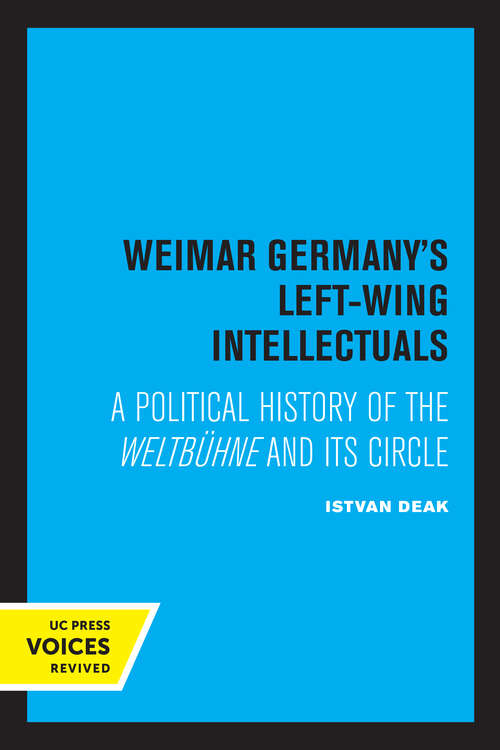Weimar Germany's Left-Wing Intellectuals: A Political History of the Weltbühne and Its Circle
By:
Sign Up Now!
Already a Member? Log In
You must be logged into Bookshare to access this title.
Learn about membership options,
or view our freely available titles.
- Synopsis
- The Germany between the two world wars, which produced some of the greatest literary lights of the century, also produced a forum worthy of them: the brilliantly edited, crusading, lef-oriented (but not party-affiliated) Weltbühne. The present book tells the history of this weekly Berlin journal, discusses the men that ran it and wrote it, and outlines the causes for which it fought. The Weltbühne had three editors--the uncompromising style-conscious Siegfried Jacobsohn, the sharp-tongued, satirical Kurt Tucholsky, and the enigmatic, aristocratic Carl von Ossietzky, martyred by the Nazis. The radical, intellectual elite of Germany (and to come extent outside Germany) contributed to the journal -- Heinrich Mann, Alfred Polgar, Erich Kästner, Alfred Doblin, Bertolt Brecht, Leonhard Frank, Theodor Plievier, Rene Schickele, Lion Feuchtwanger, Ernst Toller, Arnold Zweig; also Arthur Koestler, Romain Rolland, Henry Barbusse, and Leon Trotsky. These men stood for the demilitarization of Germany, the purge of the reactionary administration and judiciary, the end of all restraints on human rights (including the restraints on abortion and homosexuality), complete equality of women, pacifist educational policies, the intellectualization of politics and politicization of the intellectuals, unity of the working-class parties, and socialism. When, on May 11, 1933, on Opera Square in Berlin, the stormtroopers burned books of fifteen authors sinning against the German Volk, thirteen of them had made contribution to the Weltbühne; and since many of them were Jews, the auto-da-fé gave special pleasure to the mob. Mr. Deak recreates with unusual empathy the atmosphere of the era, characterized by terrific social and political issues, which eventually lead to the disaster of the Thirties. The campaigns of the Weltbühne failed, and the contributors were killed or went into exile, with the journal itself moving from Berlin to Vienna to Prague to Paris before it died. Mr. Deak makes a lasting contribution to history by opening to a broader public the records preserved in the pages of this important but largely ignored journal, by selecting and interpreting the issues, and by brining to life the personalities that gave the era its intellectual profile. And understanding of the Weltbühne campaigns is indispensable for an appraisal of Central European politics in the first half of our century. Mr. Deak, in this readable book written with the passionate interest of a person who seems to have been a participant rather than a chronicler, makes this understanding possible by a lucid exposition and a searching analysis of the events. This title is part of UC Press's Voices Revived program, which commemorates University of California Press's mission to seek out and cultivate the brightest minds and give them voice, reach, and impact. Drawing on a backlist dating to 1893, Voices Revived makes high-quality, peer-reviewed scholarship accessible once again using print-on-demand technology. This title was originally published in 1968.
- Copyright:
- 2024
Book Details
- Book Quality:
- Publisher Quality
- Book Size:
- 358 Pages
- ISBN-13:
- 9780520310285
- Related ISBNs:
- 9780520357006, 9780520305649
- Publisher:
- University of California Press
- Date of Addition:
- 03/29/24
- Copyrighted By:
- by
- Adult content:
- No
- Language:
- English
- Has Image Descriptions:
- No
- Categories:
- History, Nonfiction
- Submitted By:
- Bookshare Staff
- Usage Restrictions:
- This is a copyrighted book.
